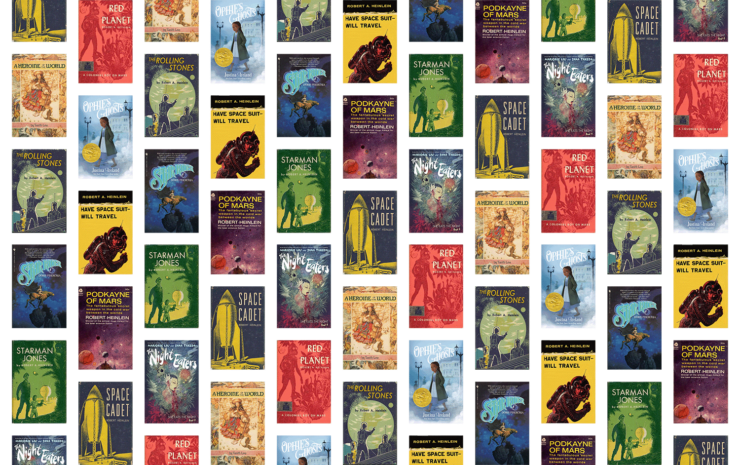I recently1 reread all of Robert A. Heinlein’s classic juveniles, plus Starship Troopers and Podkayne of Mars. A recurring issue with which Heinlein and every other author narrating teen adventures must deal is… parents. In theory, parents mentor and protect their offspring. They should actively keep their teens out of danger. How to get those parents out of the way so the teens can have thrilling adventures?
There are at least five tried-and-true solutions for this issue, none unique to Heinlein… although he does provide handy examples.
Absent Parents
Parents cannot interfere if they are elsewhere or even better, dead2. In Starman Jones, for example, Max Jones’ birth parents are too dead to prevent him from seeking adventure out in the stars.
Tanith Lee was also inordinately fond of the orphan solution3. Take Lee’s 1989 A Heroine of the World. Aradia’s parents are present barely long enough to perish in war. Arcadia’s aunt prudently dies by suicide before the invading Kronians arrive. Arcadia is left to navigate the realities of a defeated nation on her own.
None of the available options are pleasant, nor has Arcadia much freedom to select among them. Having no choice, she navigates her way from predatory guardian to predatory guardian. Hers is not a world rich in happy endings. Nevertheless, she holds onto hope, for what that is worth.
Indifferent Parents
Perhaps the protagonists’ parents have enough children that misplacing one is no great tragedy. Perhaps they feel that kids learn best by doing. Perhaps the parents are simply moral vacuums. Space Cadet Matt Dodson’s parents don’t appear to be particularly invested in Matt’s career, but they also do not oppose it.
The Jakalowar species, featured in Doris Piserchia’s 1974 Star Rider, embraced depraved indifference as a parenting strategy. No sooner is a Jakalowar baby born than it is deposited on some handy habitable world to fend for itself. While this is not an entirely praiseworthy approach, it does mean that protagonist Jade and her teleporting space-dog Hinx are free to explore the galaxy without interference.
Ineffectual Parents
Perhaps the parents are alive and care about their children, but for reasons beyond their control can do little to help them. Red Planet’s Jim Marlowe, for example, does not have to worry overmuch about his parents stepping in, because for crucial portions of the novel Jim and his parents are separated by thousands of kilometers. By the time they unite, the plot is well underway.
Ophie’s mother cares about Ophie in Justina Ireland’s 2022 Ophie’s Ghosts. However, economic reality means that Ophie’s mother has to spend long hours working for a pittance at Daffodil Manor. Helping Ophie with her ghost-related issues is not an option because providing food and shelter takes priority. Alas, arranging for Ophie be hired as a maid at haunted Daffodil Manor only makes matters worse.
Supportive Parents
There are worse fates for children than to go on adventures. They might squander their lives doing nothing interesting before being run over by a truck4. A parent might well decide it’s best to support their progeny’s thrilling adventures. The Rolling Stones’ Roger Stone, for example, facilitates his twin sons Castor and Pollux’s proposed wanderjahr by orchestrating an all-family expedition across the Solar System5.
Provocative Parents
Some parents may not leave choosing adventure to their child. They may provide a firm hand between the shoulder blades as they propel their kids toward glorious purpose. Arguably, this is Kip’s father’s intention in 1958’s Have Space Suit — Will Travel. By making it clear to Kip that there’s no free ride to be had, Kip’s father forces Kip to fend for himself, whether by getting a job at the local soda fountain, entering jingle contests, or saving the Earth from predatory aliens.
Billy and Milly’s mother Ipo, introduced in Marjorie Liu and Sana Takeda’s She Eats the Night, has tired of Billy and Milly’s slacker ways. Determined to bring her disappointing children up to her demanding standards, Ipo drafts Billy and Milly to help refurbish the abandoned house next door. An onerous task indeed, but rendered more difficult by the house’s horrifying supernatural forces… which is precisely why Ipo selected it as a pass-fail test of character.
Are there other strategies for ensuring parents do not impede plot? Are there better examples than the ones mentioned above? Comments are below.
- A decade ago. Pardon me while I scream in existential pain. ↩︎
- Better from a storytelling perspective. Obviously, being dead is sub-par from the parents’ perspective. And quite possibly from their kids’ as well. ↩︎
- In 2016 I read forty-eight Lee novels. Forty-five had dead or missing mothers and thirty-eight dead or missing fathers. The books that featuring living parents made a strong case that being an orphan is not necessarily the worst option. ↩︎
- Truck-kun appears to be the primary cause of death in Japan, if their fiction is any indication. ↩︎
- Travel undertaken perhaps in part to delay Castor and Pollux’s inevitable arrest and lengthy sentencing for whichever harebrained and extremely criminal scheme finally proves their undoing. Given that the twins’ previous peccadillos include “experimenting with atomics inside the city limits and without license,” it is possible that Roger is also trying to protect society from his idiot sons. ↩︎










